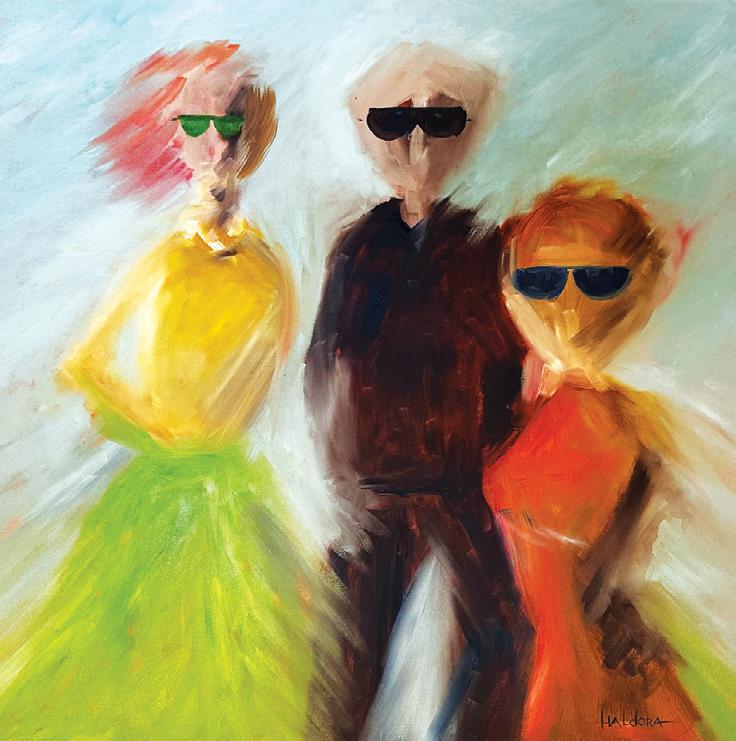
3 minute read
Sermon by Johnny Cash RANTS & RAVES
Somebody sent me a nice email a couple of weeks ago, thanking me for the occasional mention of church in this column – specifically, the fact that I go. He said it was a “wonderful Christian witness” that a lot of folks out there appreciate.
I don’t know about that – people rarely accuse me of “Christian witnessing,” and if they do, it’s not a compliment – but this email made me feel good. It was also a bit of a God-send – pardon the pun – as it gave me an idea for a column just when I was fresh out.
Our choir at First Presbyterian always takes the month of July off. I’m not sure why, but it’s a long-standing tradition that we choristers are OOL all month. (That’s ‘Out Of Loft,’ for those of you who aren’t hip to the latest choral lingo.)
For me, it’s always a nice midsummer break. I can skip church if I feel like it. Even better, if I do go, I can actually see my preacher’s face during the sermon, instead of staring at the back of his head.
Leaving church last Sunday, I told him how much I’d enjoyed that. My preacher has a nice face. Expressive.
The whole service was expressive, actually. With the choir OOL, our music director had brought in a string band to lead the congregation in a bunch of old-time hymns that are tailor-made for such accompaniment. We had a mandolin, a fiddle, a bass, and a guitar. It was heaven.
We sang familiar fare like “Come, Thou Fount of Every Blessing,” and “Softly and Tenderly, Jesus is Calling.” The strings imbued these church standards with a country/bluegrassy feel we don’t often hear at First Pres.
I believe this is music that resonates deep in the heart of every Southerner, Christian or otherwise.
Before playing the morning’s anthem – a beautiful rendition of the gospel song “Farther Along” – the band performed an old Johnny Cash tune I’d never heard before. Our music director introduced it, warning us that it was “funny, not serious,” and that he’d gotten “permission from the boss” to play it. (I think he was talking about the minister, not God.)
The song starts like this:
There once was a musical troupe
A pickin' singin' folk group
They sang the mountain ballads And the folk songs of our land.
They were long on musical ability Folks thought they would go far But political incompatibility Led to their downfall.
Well, the one on the right was on the left And the one in the middle was on the right And the one on the left was in the middle And the guy in the rear . . . was a Methodist.
The band substituted “Presbyterian” for “Methodist,” for laughs, which they got. Having been both a Methodist and a Presbyterian in my day, I can tell you there’s not much difference. The integrity of the song remained intact.
The band continued for several stanzas, each one funnier than the one before. The “musical troupe” in the Johnny Cash song ends up in fisticuffs on stage, over politics, thus tanking their illustrious future and condemning themselves to work ho-hum jobs like the rest of us. The congregation of First Pres laughed and laughed, and when the song was over, we clapped. A few people even hooted.
Suffice it to say, clapping and hooting are not the Presbyterian way. We’re a very proper people.
But it sure felt great.
Let’s face it. Our national polarization is no laughing matter. In fact, it often brings me to tears. But there’s something about seeing it – hearing it – through the lens of art that takes the sting out. Helps us forgive each other . . . and ourselves.
For being so damn stubborn. So dug in. So sure of our own righteousness. So quick to judge others as evil.
Church does the same thing art does, by the way. In fact, I often think of worship as an artform. This may be a blasphemous thing to say, and if so, I hope God will forgive me. But the catharsis I sometimes experience at church is not unlike the feeling I get in the audience of a Broadway musical. That feeling that my heart has just been cracked open – sometimes rather painfully – and filled to the brim with wonder, gratitude, humility, and love for my fellow humans.
Here in America, it's all the rage – these days and historically – to pretend that our deepest divisions fall between people of different races, religions, and sexual orientations. We are all steeped in this national narrative; it’s one we’ve been dragging around for so long now, nobody quite knows how to let it go.
But I think it’s hogwash. In my observation, our deepest, most dangerous divisions today are political – and not even always between parties, but within parties. We are still as tribal as we ever were, but ideologies – belief systems – are the new










